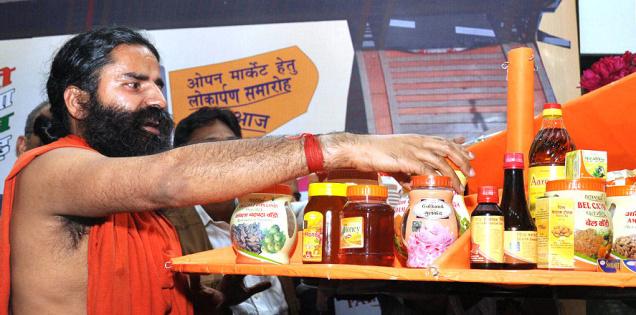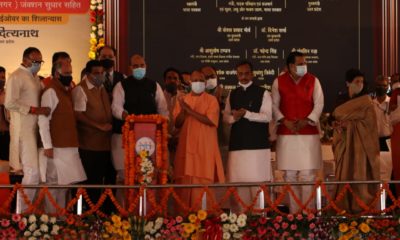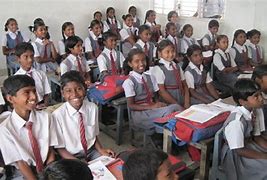Feature
Another product of Baba Ramdev’s Patanjali found unsafe by food department

Lucknow: The famous Yoga guru Baba Ramdev and his popular brand Patanjali today landed in trouble after one of its product has been found not up to the mark by the officials of Food department in Uttar Pradesh’s Barabanki district.
According to Pediatrician District Hospital Barabanki, Dr S.K Singh says that this product has proved failure in investigation, after which a penalty has been imposed on company and on shopkeeper who was selling this famous product.
Basically, food department in its report mentioned that one of Patanjali’s product has been found below standard and some harmful content has been found in double quantity from its required amount.
The Chief Food Inspector Barabanki said that incident of harmful content in its double quantity proves that Baba Ramdev’s Patanjali each and every product is not safe for consumption and we should not trust it blindly.
Earlier, Patanjali Ayurved Ltd has been slapped with a Rs. 11 lakh fine by a city court for misbranding and misrepresentation of its products. The fine has to be paid within a month.
The case had been ongoing since November 2012. The judge, Lalit Narain Mishra, found that the company was guilty of “releasing misleading advertisements by selling certain products with its labels although they were being manufactured by some other firm.”
Baba Ramdev’s Patanjali product lands in trouble after facing food department’s ban:
The company was charged under Section 52 (misbranding) and Section 53 (misleading advertisement) of the Food Safety and Standards Act, 2006 as well as Section 23.1 (5) of Food Safety and Standard (Packaging and Labelling Regulations, 2011) Act.
The court also ordered the district food safety department to “take appropriate action if there is no improvement in the products in future.”
The case was filed against the company in November 2012 by District Food Safety Department when some of the products, including eatables like honey, salt, mustard oil, jam and besan (gram flour) failed quality tests. Tests were conducted at Uttarakhand’s only FSSAI-certified drugs and food testing lab located at Rudrapur.
In July, Advertising Standards Council of India or ASCI had pulled up the company for running “misleading” ad campaigns which made light of competitors’ products, which is against the ASCI norms.
Patanjali’s claim that rivals were making “‘Kachi Ghani Mustard Oil’ “adulterated with oil made by solvent extraction process with neurotoxin containing Hexane” was found unsubstantiated by the Consumer Complaints Council.
The company had also failed to prove that other companies sell “expensive juices containing less pulp”. It also failed to prove that “other companies mix 3 to 4 per cent urea and other non-edible things in their cattle feed,” compared to their ‘Patanjali Dugdhamrut’ cattle feed.
Also read Famous Patanjali of Baba Ramdev to make undergarment of males-females:
Entertainment
Meghalaya Reserves Legalized Gambling and Sports Betting for Tourists

The State Scores Extra High on Gaming-Friendly Industry Index
Meghalaya scored 92.85 out of 100 possible points in a Gaming Industry Index and proved to be India’s most gaming-friendly state following its recent profound legislation changes over the field allowing land-based and online gaming, including games of chance, under a licensing regime.
The index by the UK India Business Council (UKIBC) uses a scale of 0 to 100 to measure the level of legalisation on gambling and betting achieved by a state based on the scores over a set of seven different games – lottery, horse racing, betting on sports, poker, rummy, casino and fantasy sports
Starting from February last year, Meghalaya became the third state in India’s northeast to legalise gambling and betting after Sikkim and Nagaland. After consultations with the UKIBC, the state proceeded with the adoption of the Meghalaya Regulation of Gaming Act, 2021 and the nullification of the Meghalaya Prevention of Gambling Act, 1970. Subsequently in December, the Meghalaya Regulation of Gaming Rules, 2021 were notified and came into force.
All for the Tourists
The move to legalise and license various forms of offline and online betting and gambling in Meghalaya is aimed at boosting tourism and creating jobs, and altogether raising taxation revenues for the northeastern state. At the same time, the opportunities to bet and gamble legally will be reserved only for tourists and visitors.
“We came out with a Gaming Act and subsequently framed the Regulation of Gaming Rules, 2021. The government will accordingly issue licenses to operate games of skill and chance, both online and offline,” said James P. K. Sangma, Meghalaya State Law and Taxation Minister speaking in the capital city of Shillong. “But the legalized gambling and gaming will only be for tourists and not residents of Meghalaya,” he continued.
To be allowed to play, tourists and people visiting the state for work or business purposes will have to prove their non-resident status by presenting appropriate documents, in a process similar to a bank KYC (Know Your Customer) procedure.
Meghalaya Reaches Out to a Vast Market
With 140 millions of people in India estimated to bet regularly on sports, and a total of 370 million desi bettors around prominent sporting events, as per data from one of the latest reports by Esse N Videri, Meghalaya is set to reach out and take a piece of a vast market.
Estimates on the financial value of India’s sports betting market, combined across all types of offline channels and online sports and cricket predictions and betting platforms, speak about amounts between $130 and $150 billion (roughly between ₹9.7 and ₹11.5 lakh crore).
Andhra Pradesh, Telangana and Delhi are shown to deliver the highest number of bettors and Meghalaya can count on substantial tourists flow from their betting circles. The sports betting communities of Karnataka, Maharashtra, Uttar Pradesh and Haryana are also not to be underestimated.
Among the sports, cricket is most popular, registering 68 percent of the total bet count analyzed by Esse N Videri. Football takes second position with 11 percent of the bets, followed by betting on FIFA at 7 percent and on eCricket at 5 percent. The last position in the Top 5 of popular sports for betting in India is taken by tennis with 3 percent of the bet count.
Local Citizens will Still have Their Teer Betting
Meghalaya residents will still be permitted to participate in teer betting over arrow-shooting results. Teer is a traditional method of gambling, somewhat similar to a lottery draw, and held under the rules of the Meghalaya Regulation of the Game of Arrow Shooting and the Sale of Teer Tickets Act, 2018.
Teer includes bettors wagering on the number of arrows that reach the target which is placed about 50 meters away from a team of 20 archers positioned in a semicircle.
The archers shoot volleys of arrows at the target for ten minutes, and players place their bets choosing a number between 0 and 99 trying to guess the last two digits of the number of arrows that successfully pierce the target.
If, for example, the number of hits is 256, anyone who has bet on 56 wins an amount eight times bigger than their wager.



























